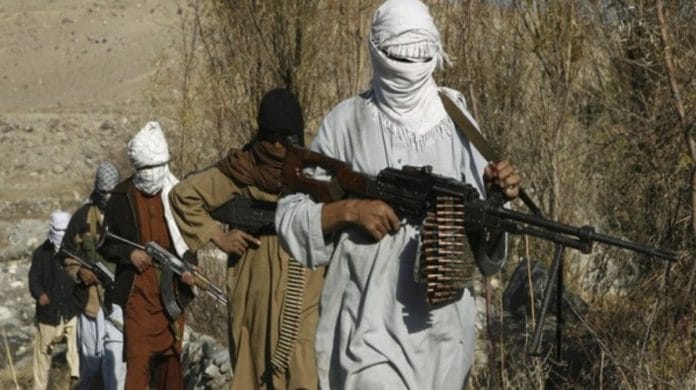In just a week, the house of cards called ‘good Taliban-bad Taliban’ built arduously over the past several years fell down. Taliban 2.0 came with images changing at a dizzying speed. It began on 15 August as a dreaded marching and conquering force, then morphed into prayers at runaway president Ashraf Ghani’s desk, before devolving into videos of bumper car rides and trampoline jumps. A clip from Vice News‘ June documentary also emerged, showing group members laughing at a reporter. Somewhere in this busy week, the Taliban also told women not to work in banks and conducted deadly house-to-house searches looking for Afghan translators, aides and foreign journalists, killing a relative of a reporter of German broadcaster Deutsche Welle.
As the shocked global community directed its anger at the Taliban and US President Joe Biden by turn, India’s External Affairs Minister S. Jaishankar told the UN Security Council that it must not “take a selective, tactical or complacent view of the problems we face”, not unlike the caution with which it approached the group in 1996.
This is the reason why the Taliban are ThePrint’s Newsmaker of the Week.
Also read: ‘This week has torn open wounds’ — UK MP who served in Afghanistan tears into NATO withdrawal
India’s engagement
When the Taliban came to power in Afghanistan in 1996, India had taken some cautious steps, always identifying the group as a terrorist organisation even as New Delhi had been targeted by the Haqqani Network, one of its affiliated groups.
The Pakistan element kept India at the back of the queue when it came to directly dealing with the Taliban, even though the group has never seen New Delhi as its enemy.
India had been engaging with the Taliban leaders in Doha since September 2020 when the intra-Afghan dialogue began even as New Delhi refused to spell out its policy clearly and said it continues to engage with “all stakeholders”.
On 10 August, New Delhi shut down its consulate at Mazar-I-Sharif in the wake of growing threats that the fourth-largest city and one of the main commercial hubs of Afghanistan will be overrun by Taliban insurgents. All its other consulates in Herat, Jalalabad, and Kandahar were closed before.
However, India was still assessing whether it should close down its embassy in Kabul because the Taliban had been closing in around the capital at a blistering pace with the world watching helplessly.
Also read: There are many fault lines between Taliban and its backers. India can wait it out
Kabul falls
As soon as the Taliban took over the city of Ghazni and Kandahar by 12 August, a US intelligence assessment said Kabul could fall in another 90 days.
But on 15 August, as India was celebrating its 75th Independence Day, Afghanistan capital city fell into the hands of the Taliban like a pack of cards.
Kabul, which has a population of about six million, fell within hours and the Taliban’s armed boys and turbaned men were seen marching on the city’s streets, loaded in pick-up trucks, Land Cruisers and Hiluxes with their white flags flying high even as life-sized photos of Ahmad Shah Massoud — Afghanistan’s legendary rebel fighter — that adorn Kabul’s roads watched silently.
The developments over the past two weeks have baffled world capitals, including New Delhi, which still had some residue of faith left in the ousted president, Ashraf Ghani.
In his address to the nation on 14 August, Ghani acknowledged that his country is in grave danger, but he also talked about boosting forces and standing firm against the Taliban, which at that time was about 30-40 km away from the capital. All that turned out to be a subterfuge as Ghani fled the country hours later, leaving his nation at the mercy of the Taliban.
Also read: From Mazar to Kabul, I saw Afghanistan fall to Taliban in 10 days
A new chapter
In a recent interview to ThePrint, Afghanistan’s former Prime Minister Gulbuddin Hekmatyar said that India and Pakistan should not bring their rivalries to Afghanistan.
Although Pakistan has repeatedly denied its involvement in the Taliban’s resurgence after the latter’s ouster by the US forces in 2001, it was one of the countries – besides Saudi Arabia and the United Arab Emirates (UAE) – to recognise the Taliban when they were in power and maintain diplomatic ties with the group.
However, many in India now believe that New Delhi should talk with the Taliban even though it remains to be seen whether the group roaming the streets of Kabul is any different from the one sitting in Doha.
On Monday, in less than 24 hours since taking over Kabul, the Taliban unleashed new terror and mayhem. But for some, it wasn’t totally unexpected.
Recently, in its first press conference in Kabul, the Taliban leaders said, “Freedom and independence seeking is a legitimate right of every nation. The Afghans also use their legitimate right after 20 years of struggle for freedom and for emancipating the country from occupation, this was our right and we achieved this right.”
Much has also been blamed on the Joe Biden administration for withdrawing US troops from Afghanistan so quickly that some have called it “abandonment.”
The Taliban’s plan to now govern and establish a rule of law in Afghanistan remains uncertain while people there continue to live in absolute fear as lakhs jostle every day to somehow make it out of the country.
While the Taliban say everything in Afghanistan will be run according to the ‘Sharia’ rule, how they depict, decipher and implement that Sharia law is the biggest question facing the Afghans.
Views are personal.
(Edited by Prashant Dixit)






